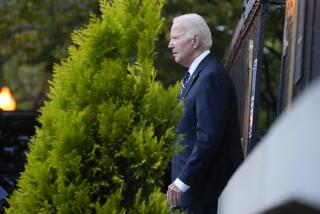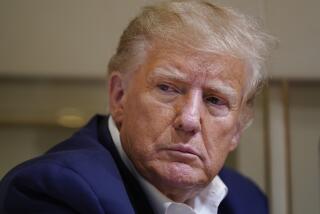Reagan Denied Illegal Acts, Report Says
- Share via
WASHINGTON — Former President Ronald Reagan, in videotaped testimony last week in the Iran-Contra trial of his national security adviser, denied authorizing or knowing about any illegal activity, CBS News reported Monday.
The network, quoting sources familiar with the closed testimony in a Los Angeles federal courtroom, reported Reagan said that under no circumstances did he approve or direct anyone to make false statements, conceal information or destroy anything to keep Congress from learning about the worst scandal of his presidency.
Nor was he aware, CBS reported Reagan testified, that any Iran-Contra activity was going on.
And, in a key piece of testimony that could help the defense of former National Security Adviser John M. Poindexter, CBS said Reagan described as “innocuous” letters that Poindexter wrote to Congress asserting that the NSC staff was in compliance with the spirit and letter of the law regarding support of the Nicaraguan Contras.
The letters are a critical part of Poindexter’s defense. The charges against the retired Navy rear admiral involve obstructing a congressional inquiry and making false statements to Congress about arms sales to Iran and secret efforts to aid the Contras in their guerrilla war against the Nicaraguan government. At the time, Congress had banned such direct U.S. assistance.
Reagan reportedly gave a spirited description of his belief for the United States to back the Contras as well as the need for secrecy surrounding attempts to get Iran to release U.S. hostages.
The testimony marked the first time Reagan has been a witness in any of the trials involving the Iran-Contra scandal. He declined to answer questions from reporters when he left the downtown courtroom Saturday afternoon.
During the two days of testimony, however, CBS quoted sources as saying there were many details that Reagan said he could not remember. And one source told the network that Reagan, although very alert, sometimes became confused by questions.
Observers told CBS that there were no claims of executive privilege by the former President, and little disclosure of classified information, a main reason why the public was barred from the courtroom.
More to Read
Sign up for Essential California
The most important California stories and recommendations in your inbox every morning.
You may occasionally receive promotional content from the Los Angeles Times.













